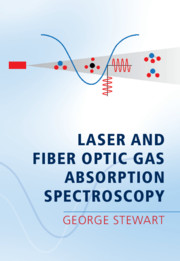Book contents
- Laser and Fiber Optic Gas Absorption Spectroscopy
- Laser and Fiber Optic Gas Absorption Spectroscopy
- Copyright page
- Dedication
- Contents
- Preface
- 1 Absorption Spectroscopy of Gases
- 2 DFB Lasers for Near-IR Spectroscopy
- 3 Wavelength Modulation Spectroscopy with DFB Lasers
- 4 Photoacoustic Spectroscopy with DFB Sources
- 5 Design and Application of DFB Laser Systems and Optical Fibre Networks for Near-IR Gas Spectroscopy
- 6 Principles of Fibre Amplifiers and Lasers for Near-IR Spectroscopy
- 7 Applications of Fibre Amplifiers and Lasers in Spectroscopy
- 8 Mid-IR Systems and the Future of Gas Absorption Spectroscopy
- Index
- References
2 - DFB Lasers for Near-IR Spectroscopy
Published online by Cambridge University Press: 07 April 2021
- Laser and Fiber Optic Gas Absorption Spectroscopy
- Laser and Fiber Optic Gas Absorption Spectroscopy
- Copyright page
- Dedication
- Contents
- Preface
- 1 Absorption Spectroscopy of Gases
- 2 DFB Lasers for Near-IR Spectroscopy
- 3 Wavelength Modulation Spectroscopy with DFB Lasers
- 4 Photoacoustic Spectroscopy with DFB Sources
- 5 Design and Application of DFB Laser Systems and Optical Fibre Networks for Near-IR Gas Spectroscopy
- 6 Principles of Fibre Amplifiers and Lasers for Near-IR Spectroscopy
- 7 Applications of Fibre Amplifiers and Lasers in Spectroscopy
- 8 Mid-IR Systems and the Future of Gas Absorption Spectroscopy
- Index
- References
Summary
A detailed account of the electronic, thermal and optical properties of DFB lasers is presented relevant to the requirements of wavelength modulation spectroscopy. An RC thermal model is first used to provide a simple analytical description of the thermal scanning and wavelength tuning properties of the laser and then a one-dimensional solution of the heat conduction equation is derived for a better description of thermal tuning. Perturbationanalysis of the laser rate equations is used to determine the effect of current modulation on the carrier, intensity and wavelength modulation, taking into account both spectral and spatial hole-burning effects. Theoretical relationships are derived for the overall tuning coefficient, combining both thermal and carrier contributions, with expressions given for its magnitude and phase as a function of the modulation frequency relative to the intensity modulation. This is important for the interpretation of the harmonic components that arise with wavelength modulation spectroscopy. It is shown how a fibre-optic ring resonator may be employed for the experimental determination of the tuning coefficient and for calibration of wavelength scans.
Keywords
- Type
- Chapter
- Information
- Laser and Fiber Optic Gas Absorption Spectroscopy , pp. 21 - 52Publisher: Cambridge University PressPrint publication year: 2021

